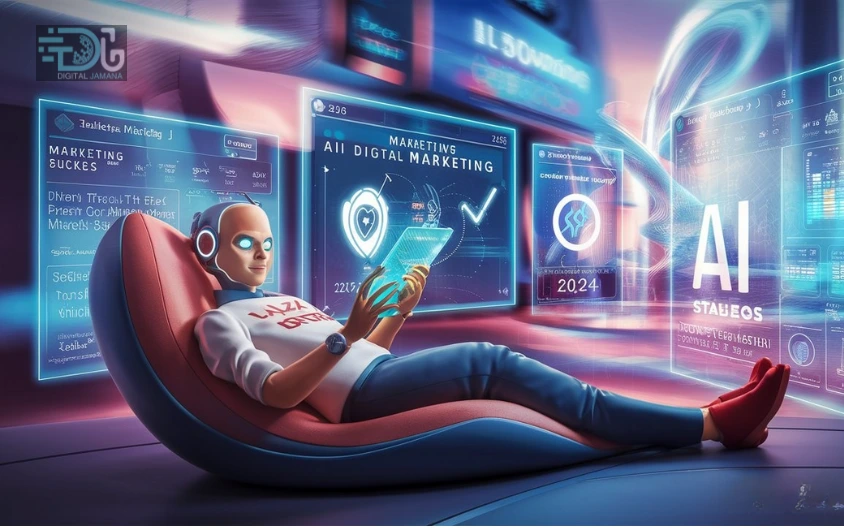AI-Powered Marketing: How AI is Shaping the Future of Digital Marketing in 2024
Artificial Intelligence (AI) has rapidly transformed the landscape of digital marketing, becoming an essential tool for brands and marketers to stay competitive. The ability of AI to process vast amounts of data, recognize patterns, and automate tasks with precision is revolutionizing how businesses approach their marketing strategies. In 2024, AI continues to shape the future of digital marketing in ways that offer efficiency, personalization, and improved customer experiences. This blog will explore how AI is influencing the digital marketing space, focusing on key trends, tools, and the benefits it brings to businesses.
Personalization at Scale
One of the most significant impacts of AI in digital marketing is the ability to offer highly personalized customer experiences at scale. Personalization is no longer limited to addressing users by their first names in emails; AI can now tailor the entire journey based on individual user behavior.
AI-powered algorithms analyze a customer’s preferences, past behavior, browsing habits, and purchase history to create tailored marketing campaigns. For instance, platforms like Netflix and Amazon use AI to recommend content and products based on past interactions. This level of personalization leads to higher engagement, customer satisfaction, and ultimately, more conversions.
AI-driven chatbots and customer service systems also enhance personalization. They can deliver human-like interactions, responding to customer queries instantly and offering product recommendations based on the user’s preferences. As businesses continue to focus on improving user experiences, personalized AI interactions are becoming the norm.
Predictive Analytics for Better Decision Making
AI is empowering marketers with predictive analytics, a tool that allows them to anticipate future consumer behavior based on historical data. By analyzing patterns from past marketing campaigns, purchase behaviors, and market trends, AI can predict which strategies will yield the best results. This enables businesses to optimize their campaigns and make data-driven decisions with increased confidence.
For example, AI can forecast which product lines will be most popular during a particular season or which marketing message will resonate best with a specific audience segment. This insight allows businesses to allocate their budgets more effectively, reduce waste, and improve their return on investment (ROI).
Predictive analytics also helps in identifying potential customers who are most likely to convert, allowing businesses to focus their efforts on high-value prospects. This not only enhances marketing efficiency but also maximizes revenue potential.
AI-Powered Content Creation
In the past, content creation was a labor-intensive process, requiring a team of writers, editors, and strategists. However, AI is transforming content creation by automating certain aspects of the process. AI-powered tools like ChatGPT and Copy.ai can generate high-quality content in a matter of minutes, from blog posts and social media updates to product descriptions and email copy.
While AI is not replacing human creativity, it is augmenting it. These tools provide marketers with the ability to scale content production quickly, generate data-driven content ideas, and optimize their content for SEO without needing extensive manual effort.
Moreover, AI can help identify trending topics and relevant keywords, giving content creators insights into what their audience is searching for. This helps marketers stay ahead of the curve by creating timely, relevant content that resonates with their target audience.
AI in Advertising: Smarter Ad Targeting
AI is revolutionizing digital advertising by making ad targeting smarter and more efficient. Platforms like Google Ads and Facebook Ads are already leveraging AI to optimize ad placements and improve targeting precision. AI algorithms can analyze a user’s behavior, demographics, and interests to ensure ads are shown to the right people at the right time.
In 2024, AI-driven programmatic advertising is expected to dominate. Programmatic advertising automates the buying and selling of online ad space, using real-time data to make instant decisions on which ads to show to specific users. This approach not only saves time but also ensures that marketing budgets are used effectively by reaching the most relevant audiences.
AI can also help in A/B testing ad campaigns by automatically identifying which version of an ad performs better with different audience segments. This allows for continuous optimization of advertising efforts, leading to higher click-through rates (CTR) and conversions.
Chatbots and AI-Driven Customer Service
Chatbots are one of the most visible and widely adopted uses of AI in digital marketing. AI-powered chatbots have evolved beyond simple query resolution to provide seamless, conversational experiences. They are now capable of understanding natural language, learning from interactions, and providing accurate, real-time responses to customer inquiries.
In 2024, chatbots are expected to play an even bigger role in customer service, enabling businesses to provide 24/7 support. They can handle a wide range of tasks, from answering common questions to processing orders and assisting with product recommendations. This not only reduces the burden on human customer service agents but also ensures that customers receive immediate assistance, leading to improved satisfaction and loyalty.
The integration of AI chatbots with voice assistants like Alexa and Google Assistant is another trend to watch. This convergence will make it easier for customers to interact with brands through voice commands, further enhancing the customer experience.
AI in Social Media Marketing
Social media platforms have become crucial for digital marketing, and AI is playing an instrumental role in optimizing social media strategies. AI tools can analyze social media trends, identify popular content formats, and recommend optimal posting times for maximum engagement.
For instance, AI-powered social listening tools can track brand mentions, sentiment analysis, and conversations surrounding specific topics. This helps marketers understand how their brand is perceived and how to engage with their audience effectively. AI also assists in automating social media posts, allowing businesses to maintain a consistent presence across multiple platforms without manual intervention.
Moreover, AI-driven influencer marketing tools can analyze the performance of influencers, helping brands select the right influencers based on data such as audience demographics, engagement rates, and ROI potential.
Voice Search and AI-Enhanced SEO
Voice search is rapidly growing, thanks to the increasing popularity of AI-powered voice assistants like Siri, Alexa, and Google Assistant. In 2024, it is projected that more than half of online searches will be voice-based. This shift is influencing SEO strategies, as marketers must now optimize their content for voice search queries, which tend to be longer and more conversational.
AI-powered tools can help businesses analyze voice search data, understand user intent, and create content that ranks well for voice search queries. Voice-optimized SEO will become increasingly important as more consumers rely on voice assistants for information, shopping, and other tasks.
Ethical Considerations and AI in Marketing
As AI continues to evolve, ethical considerations surrounding its use in marketing are gaining importance. Issues like data privacy, algorithmic bias, and transparency are at the forefront of discussions about AI’s role in digital marketing. Consumers are becoming more aware of how their data is being used, and brands must ensure they use AI responsibly to maintain trust.
Marketers must strike a balance between leveraging AI for personalization and respecting user privacy. Ensuring transparency in AI-driven processes and adhering to data protection regulations like GDPR will be critical in building long-term relationships with customers.
Conclusion
In 2024, AI is a game-changer in digital marketing, driving innovation in personalization, predictive analytics, and smarter advertising. It allows businesses to create efficient, data-driven campaigns, enhance customer experiences, and scale content creation. AI’s integration into tools like chatbots, voice search, and programmatic advertising continues to streamline marketing efforts. However, as AI evolves, ethical considerations like data privacy and transparency must be addressed to build trust with consumers. Ultimately, AI will remain essential for marketers looking to stay competitive, offering endless opportunities for growth and improved engagement in the Digital Jamana.

